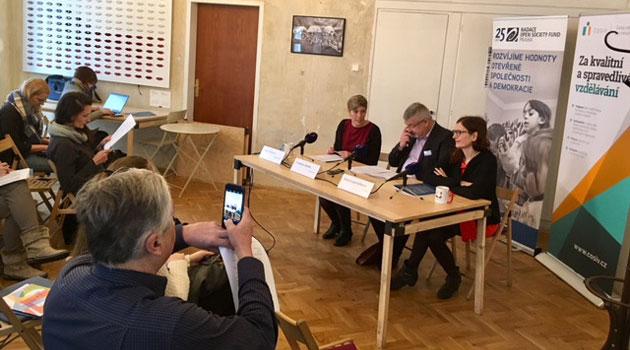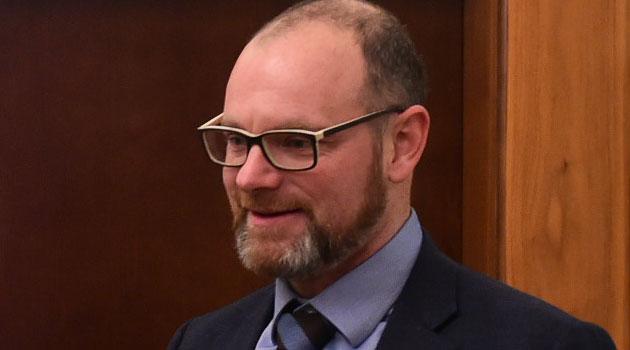Czech research finds educators believe excessive numbers of pupils in classes are barrier to inclusion

According to a survey of the opinions of principals and teachers about the impacts of the reforms for common education (amendments about inclusion), after the first year of implementing the reforms in practice what has most improved is financial support for educating children with special needs. Principals of mainstream primary schools, however, continue to grapple with a lack of assistants and special educators.
Teachers also said they see a problem with large class sizes. The findings of the survey performed by the research agency Nielsen Admosphere were presented yesterday by the Open Society Fund Prague, the Czech-Moravia Trade Union of Educational Workers, and the Czech Professional Society for Inclusive Education.
After the first year since the education reforms were implemented for children with special educational needs, it seems that what has improved most is the financing of support for their education. Mainstream primary school principals, however, are mainly complaining that they do not have enough staff.
“Our aim was to ascertain how the principals and teachers perceive the impacts of the reforms, in what sense they have aided them, and what they are still grappling with in practice, so that their voice can be heard. The survey confirmed that educating pupils of all skill levels together is already the customary reality for most schools. Of the principals of mainstream primary schools, 94 % said they already have many years of experience educating pupils with disabilities and other special educational needs. The findings of the survey point to the benefits of the reforms and to the persisting obstacles and areas where improvement or change is needed. We believe that this representative data from educators and principals can serve as important background material for the currently-discussed revision of inclusion policy ,” said Lucie Plešková of Open Society Fund Prague.
In previous years schools have frequently grappled with a lack of money to support children with special educational needs. During the last school year, however, finances were no longer an essential barrier for 72 % of principals.
“Previously-implemented surveys repeatedly found that the biggest barrier to support for the education of pupils with special educational needs in mainstream schools was a lack of financing, but according to the findings of the investigation we have just done, that is no longer the case,” said Klára Laurenčíková of the Czech Professional Society for Inclusive Education. In addition to a lack of personnel, educators said another significant barrier is having too many pupils in their classes.
Half of the teachers surveyed also pointed out that what is disproportionately burdensome to them is the administration associated with supporting children with special educational needs. Just 42 % of the principals responding said they had managed to arrange for qualified staff to perform the job of assistant to their educators, while 26 % of principals said finding such staff is problematic.
Collaboration between assistants and educators is assessed positively by 84 % of teachers. In the area of support for educators and training, 78 % of educators and 80 % of principals would welcome more intensive methodological support from the educational counseling facilities.
More than half of principals believe teachers at their schools need education in the area of methodology for working with pupils with special educational needs or with the materials designed for those pupils. “Educating all these pupils together brings the pupils with special educational needs a more or less developed system of support with financial backing. Educators would also need more targeted methodological and professional support for their daily work with such pupils. If the recommendations of the report from this research move forward decisions to benefit educators and their pupils, the involvement of the respondents in this survey will not have been in vain,” said František Dobšík, chair of the educators’ unions.
The representative sample for this investigation was aggregated by quota selection and included 507 educators and 126 principals of primary schools from all regions of the Czech Republic. The survey was commissioned by Open Society Fund Prague, the Czech-Moravia Trade Union of Educational Workers, and the Czech Professional Society for Inclusive Education.
Summary of survey findings
1) After the first year of this new legislation, midway through the two-year transition period, 49 % of principals said that thanks to these adaptations, children with special educational needs are provided better support.
2) Principals of schools where the adjustments have aided such children most frequently say that the better arrangement of financing for assistants to educators and materials was the reason children were aided.
3) According to 72 % of principals, the financing of support measures is not an essential barrier to educating such pupils.
4) According to 94 % of principals, their schools have already long had experience with educating such pupils.
5) The barrier to arranging for the education of such pupils to be of the necessary quality that was most frequently mentioned by mainstream school principals was a lack of candidates for the job of assistant to educators or for the position of special educator.
6) When looking for qualified employees for the job of assistant to educators, 42 % of principals said they are likely able to find somebody, 21 % said they are rather unlikely to find somebody, and 5 % of principals are unable to find an appropriate candidate at all.
7) Educators most frequently mentioned the high number of pupils in classes as a barrier to inclusion, with 66 % calling it an obstacle or a significant obstacle; new administrative tasks associated with providing support measures are considered disproportionately burdensome by half of the educators.
8) A total of 67 % of principals and 49 % of teachers feel sufficiently informed about the process for establishing which kinds and levels of support measures to use for such pupils; however, 60 % of principals and teachers said there is at least one area about support for such pupils where they need more information.
9) As far as support for educators and training goes, 78 % of teachers and 80 % of principals would welcome more intensive methodological support from educational counseling facilities.
10) A total of 78 % of principals said they perform an educational diagnostic on pupils to ascertain their need for first-level support measures.
11) A total of 84 % of educators assess the collaborations between assistants and educators as positive.
